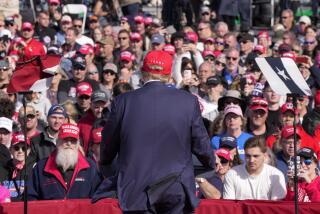Bush Defends His Credibility
- Share via
WASHINGTON — In a spirited defense of his credibility, President Bush took responsibility Wednesday for including faulty intelligence on Iraq’s nuclear aspirations in one of his speeches but insisted that he didn’t overstate the case for going to war.
“I take personal responsibility for everything I say, of course. Absolutely,” the president told reporters in the White House Rose Garden. “I also take responsibility for making decisions on war and peace.”
Bush defended prewar reports of Iraq’s weapons capabilities, saying he “analyzed a thorough body of intelligence -- good, solid, sound intelligence -- that led me to come to the conclusion that it was necessary to remove Saddam Hussein from power.”
The president discussed a number of foreign policy issues in uncharacteristic detail at the news conference, but he was most forceful in his insistence that the war in Iraq was justified and that the war on terrorism is making progress.
National security is considered Bush’s strongest selling point with voters, and the White House has been eager to tamp down questions about his credibility on the intelligence issue.
Bush said he believes that the data were convincing and overwhelming and that evidence of weapons programs will be found.
“In order to placate the critics and the cynics about intentions of the United States, we need to produce evidence, and I fully understand that,” Bush said. “I’m confident that our search will yield that which I strongly believe, that Saddam had a weapons program.”
Bush sidestepped a question asking for firm proof that Hussein had ties to the Al Qaeda terrorist network -- an assertion made frequently by the administration before the war -- by suggesting that officials are still sorting through information.
“It’s going to take time for us to gather the evidence and analyze the mounds of evidence, literally the miles of documents that we have uncovered,” Bush said. “It’s just going to take a while. And I’m sure the truth will come out.”
Questions about intelligence first arose in the immediate aftermath of the fighting in Iraq, when U.S. troops failed to find evidence that Hussein possessed nuclear, chemical or biological weapons. In the intervening months, the White House has scaled back its claims, from saying Iraq had illegal weapons to saying it had programs to make illegal weapons.
The credibility question flared again when the White House admitted that an assertion in Bush’s State of the Union address in January -- that Iraq had sought to buy uranium as part of an effort to reconstitute nuclear weapons -- was based on questionable intelligence.
White House officials first blamed the CIA for the lapse, and agency Director George J. Tenet took responsibility. But when two CIA memos that had cast doubt on the uranium assertion surfaced, Bush’s deputy national security advisor, Stephen Hadley, stepped forward to say he was responsible.
Critics charge that Bush and his national security advisor, Condoleezza Rice, should be held accountable.
Bush’s first public acceptance of responsibility during the news conference Wednesday appears to be an effort to end the debate. It also appears aimed at absolving Rice, who is rumored to be Bush’s choice for secretary of State if he is reelected.
“Dr. Condoleezza Rice is an honest, fabulous person, and America is lucky to have her service. Period,” Bush said brusquely.
On the PBS program “NewsHour With Jim Lehrer” on Wednesday, Rice said: “I certainly feel personal responsibility for this entire episode. The president of the United States has every right to believe that what he is saying in his speeches is of the highest confidence of his staff.... In this one case, the process did not work.”
Democratic presidential candidate Sen. Bob Graham of Florida said Bush’s acceptance of blame rings hollow.
“Why, after weeks of denying, has this president done a complete flip-flop and now admits he told the country something that was completely false in order to go to war?” Graham asked. “If the president thinks this will end the controversy, he’s completely wrong. It only raises more questions about what kind of cover-up has gone on inside the White House in the last few weeks in order to try to shield the president from facing culpability.”
A majority of the questions at the news conference focused on national security issues.
The president expressed confidence that it is only a matter of time before U.S. forces locate Hussein, but he declined to say how long it might take.
We’re “closer than yesterday, I guess,” Bush said. “All is know is we’re on the hunt.”
And he expressed sympathy for members of the armed forces and their families who have been separated during a longer-than-expected deployment, especially members of the 3rd Infantry Division.
“There was some concern amongst family members of the 3rd ID that they were getting mixed signals,” Bush said. “And I understand that. And now it’s clear as to their rotation plan.”
Assessing the progress made toward Middle East peace after separate meetings in the last few days with the prime ministers of Israel and the Palestinian Authority, Bush said that despite delays in meeting the deadlines in the peace initiative known as the “road map,” he believes the goal of forming an independent Palestinian state by the end of 2005 remains realistic.
“I do think it’s realistic,” Bush said. “I also know when we start sliding goals, it makes progress less realistic.”
Bush said he pressed Israeli Prime Minister Ariel Sharon in their meeting to ease restriction on movement for Palestinians. He was effusive in his praise for Abbas and the Palestinian Authority prime minister’s commitment to ending terrorist attacks on Israelis.
In other areas:
* Bush said U.S. forces will go to Liberia on a “rescue mission” to help African forces stabilize the country but said he is still waiting for certain conditions to be met. Those include the resignation of Liberian President Charles Taylor and the re-imposition of a cease-fire.
“The troops’ strength will be limited, and the time frame will be limited,” Bush said. “The idea, of course, is to go in, stabilize the situation, get [aid groups] moving back in to their positions to be able to help deliver aid, and then work immediately with the United Nations to provide blue helmets” -- U.N. peacekeeping forces -- to “take up the peacekeeping mission and the political mission.”
* Bush defended his decision against holding direct negotiations with North Korea, saying that previous diplomatic efforts proved that one-on-one talks don’t work. “The best way to convince the North Koreans to change their attitude about a nuclear weapon program is to have others in the neighborhood assume responsibility alongside the United States,” he said.
* Bush chuckled at suggestions that the U.S. was planning to attack Iran next, saying he believes that “the best way to deal with the Iranians at this point in time is to convince others to join us in a clear declaration that the development of a nuclear weapon is not in their interests.”
More to Read
Get the L.A. Times Politics newsletter
Deeply reported insights into legislation, politics and policy from Sacramento, Washington and beyond. In your inbox twice per week.
You may occasionally receive promotional content from the Los Angeles Times.










